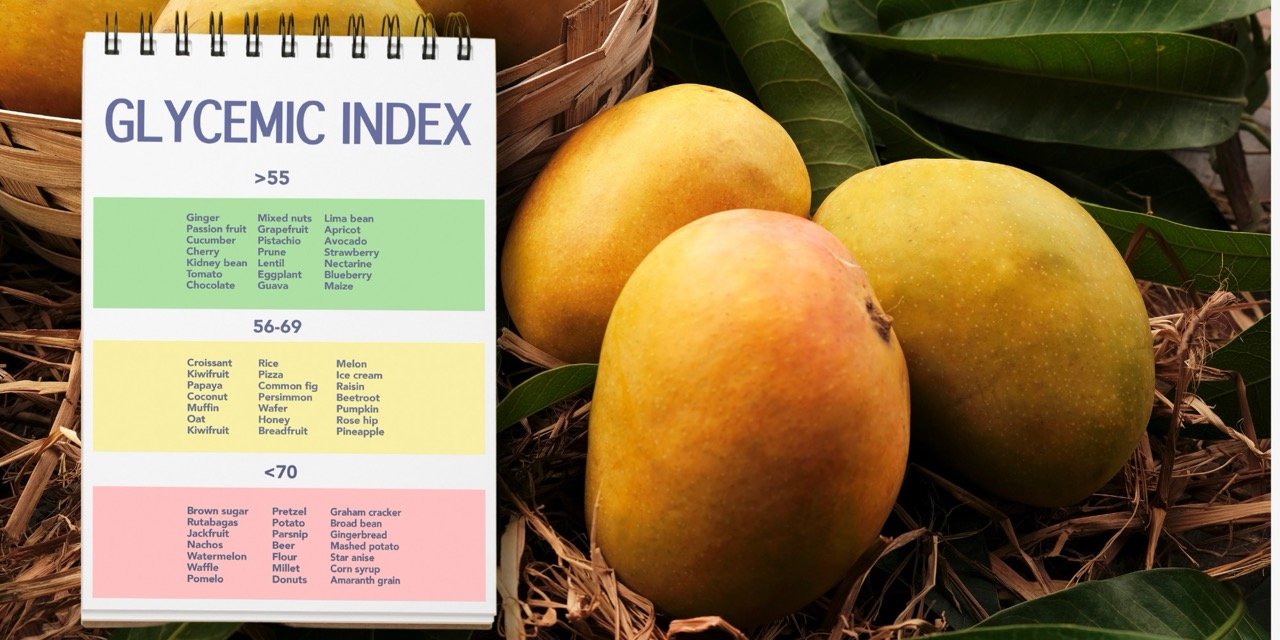Mangoes, often called the “king of fruits,” are not only loved for their sweetness but are also packed with essential vitamins, fiber, and antioxidants. However, for those concerned about managing their blood sugar levels, it’s crucial to understand the glycemic index (GI) and glycemic load (GL) of mangoes to ensure they can be safely enjoyed without causing major spikes in blood glucose, Mango Fruit Glycemic Index.
What is the Glycemic Index (GI)?
The glycemic index is a scale that ranks carbohydrates in foods according to how they affect blood sugar levels. Foods are classified as low, medium, or high GI:
- Low GI: 55 or below (slow release of glucose into the bloodstream)
- Medium GI: 56-69 (moderate release)
- High GI: 70 or above (rapid glucose release)
Mango Fruit Glycemic Index: Low to Moderate
Mangoes typically have a GI range of 41 to 60, depending on the ripeness and variety of the fruit. This makes mangoes a low to moderate GI fruit, generally considered safe to consume in moderation, even for those with blood sugar concerns like diabetics.
- Average GI of Mango: Around 51, placing it in the low GI category.
- Factors Affecting GI: Ripeness is a key factor in determining the GI. The riper the mango, the more sugar it contains, which can slightly raise its GI. Less ripe mangoes, containing more starch, will generally have a lower GI.
Glycemic Load (GL): A More Practical Measure
While GI measures how quickly a carbohydrate turns into glucose, glycemic load takes into account the portion size and gives a clearer picture of how much the food impacts blood sugar levels overall. For mango:
- Average GL of Mango: 8.5 for a 120g serving, which is considered low. Foods with a glycemic load under 10 are typically categorized as low impact on blood sugar.
This means that while mangoes have a moderate glycemic index, their overall impact on blood sugar is relatively mild due to the reasonable serving size.
Factors Affecting Mango Fruit Glycemic Index
- Ripeness: As mangoes ripen, starches turn into sugars, increasing their sweetness. This also raises their GI slightly. Unripe mangoes have more complex carbohydrates, leading to a slower digestion process and a lower GI.
- Variety: Different varieties of mango can have varying levels of sweetness, and thus different GI levels. For instance, Alphonso mangoes, known for their rich sweetness, might have a slightly higher GI than varieties like Totapuri, which are less sugary.
- Fiber Content: Mangoes are a good source of dietary fiber, which can help moderate the release of glucose into the bloodstream. This helps to prevent blood sugar spikes and makes mangoes more suitable for those monitoring their glucose levels.
Health Benefits of Mangoes
Despite concerns over its sugar content, mangoes provide numerous health benefits, including:
- Rich in Nutrients: Mangoes are high in Vitamin C, Vitamin A, and folate, supporting immune function and eye health.
- Antioxidants: They are packed with antioxidants, including beta-carotene and mangiferin, which help combat oxidative stress and inflammation.
- Digestive Health: The fiber content in mangoes promotes digestive health by preventing constipation and aiding in regular bowel movements.
Managing Blood Sugar While Enjoying Mangoes
For people with diabetes or those who want to manage blood sugar, portion control is essential. Here are some tips:
- Watch Portions: Stick to a single serving (about ½ to 1 cup) of mango to keep the glycemic load low.
- Pair with Protein/Fats: Pairing mango with a source of protein or healthy fats, such as nuts or yogurt, can slow down the absorption of sugar and prevent spikes in blood glucose.
- Enjoy Unripe Mangoes: Since unripe mangoes have a lower GI, incorporating them into dishes like salads or pickles can provide the mango flavor with less impact on blood sugar.
Conclusion: Can You Eat Mangoes if You’re Watching Your Blood Sugar?
Yes, mangoes can be enjoyed in moderation even if you’re mindful of your blood sugar. The key is understanding portion sizes and the ripeness of the fruit. With a low to moderate glycemic index and a manageable glycemic load, mangoes are a nutritious and flavorful fruit that can fit into a balanced diet when consumed wisely.
If you’re looking to indulge in this tropical delight without worrying about blood sugar spikes, just remember that moderation is key, and pairing it with other low-GI foods or proteins can help balance its effect on your glucose levels.
